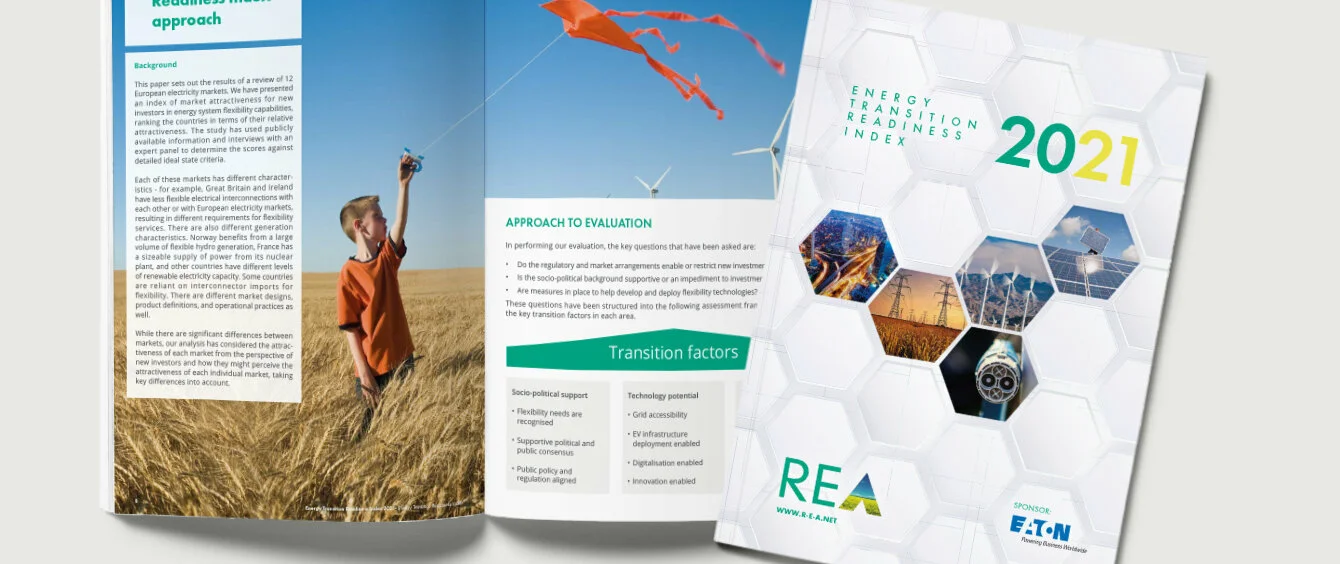How ready are European nations to implement the energy transition? Answers to this question are provided by the Energy Transition Readiness Index 2021 (ETRI) published by the Association of Renewable Energy and Clean Technology (REA). The non-profit organisation established a series of criteria to prepare a twelve-country ranking, which shows how well the markets have geared up to take on the challenges of transforming the energy system.
Country evaluations rest on three pillars, referred to as transition factors, the first being socio-political support. In addition, REA experts assessed the extent to which broad political and public consensus for the transformation exists and to which the legal framework is being adapted to it. Technological potential is the second factor. This includes network access, expanding electric mobility as well as subsidising digitisation and innovations. The third factor determined by the authors is market access. What was explored in this respect was whether providers had equal opportunities and transaction costs allow for flexibility.
The experts considered a host of parameters in ranking the countries in each of the categories. Examples are the current share of the electricity mix accounted for by renewables, expansion targets, and demand projected for 2030. Due regard was also paid to progress made in areas of import to flexibilising the energy system such as smart meter rollout, i.e. switching to intelligent measuring systems like digital electric meters.
Nordic nations lead the pack
A maximum of five points was awarded to each country. In the overall rankings, Spain and Italy fared the worst, receiving a mere two points each, bested by France, Germany, Switzerland and the United Kingdom with three points each. Denmark, Ireland and the Netherlands each racked up four points, only just trailing Finland, Norway and Sweden sharing first spot, having amassed five points each.
The rankings in each category reflect the overall result. Here, too, the Scandinavian nations lead those of Central Europe, which in turn are ahead of the countries of Southern and Western Europe. Despite this, some countries have outliers. For instance, Italy and Spain scored just one point in terms of market access, but performed better in the other categories, while France, Germany and the United Kingdom registered a below-average two points. Furthermore, according to ETRI, Germany and the United Kingdom are laggards when it comes to digitisation, with their scores in this area being the poorest in the technological potential category.
Major need to take action
Besides giving insight into the transformation potential of each country, the ETRI authors issue recommendations regarding the energy transition based on their analyses. They believe that, to put the emission targets for 2030 within reach, the systems must become much more flexible. In addition, focussing on the expansion of renewable energy is insufficient to ensure security of supply. Moreover, flexibility resources must be increased, for example by building large-scale energy storage systems. In addition, markets must be reformed in order to fully tap dormant potential. The experts also find that fair and open markets would provide investors with the security needed to finance new technologies.
This makes ETRI a yardstick for investors in determining how attractive the markets are. Its order of merit demonstrates a substantial need for action in low-ranking countries. These nations must take measures with resolve with a view to achieving their climate goals in time and without incurring significant additional costs.
